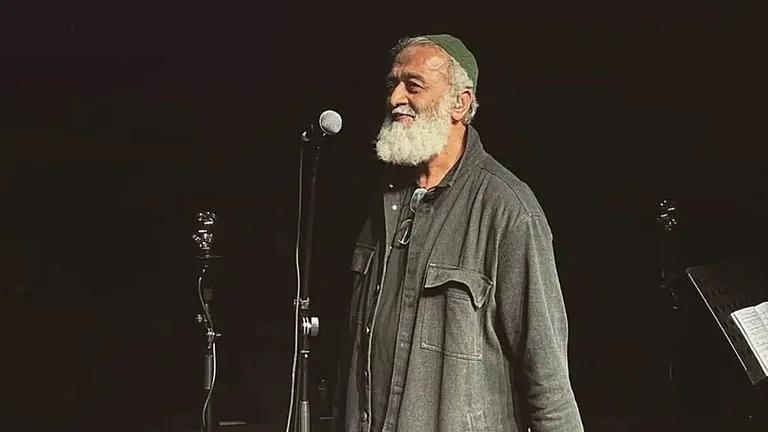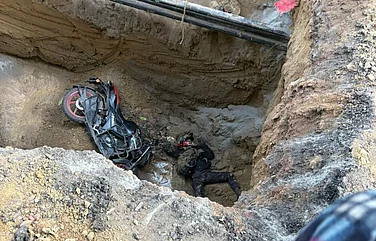The winner of the Tamil Nadu election appears to be Vijaykanth, an actorknown as the poor man's Rajnikanth (now figure that out!). With one seat forVijaykanth from Vridhachalam, the success does not manifest itself in 'partyposition' tables. However, with 8.3 percent of the popular vote, with no one foran ally, his party has proved to be a spoiler in more than a hundredconstituencies. He is threatening to emerge as the only pan-Tamil Nadu forcenext to DMK and the AIADMK. Travelling across Tamil Nadu in April 2006, I raninto several people who said they would vote for Vijaykanth's party. Asked togive the full name of his party, they fumbled. 'Desiya DMK' said one person inThirumangalam who was in favour of the party. Quizzed further, "What doesit matter, Vijaykanth's candidate will poll 20,000 votes here," he saidemphatically. The figure became an Election Commission of India statistic on May11, with Desiya Murpoku Dravidar Kazhagam's T. Thanapandian polling 19,970 votesin Thirumangalam, coming third.
Vijaykanth was not imaginative in christening his party. The trend with newTamil parties in the last 15 years has been to eschew the Dravida/ Dravidar tagin their nomenclature—be it Puthiya Tamizhagam, Pattali Makkal Katchi orViduthalai Chiuththaigal (literally Liberation Pathers, known however as DalitPanthers of India, DPI). Vaiko's MDMK (Marumalarchi Dravida Munnetra Kazahagam)was an exception, but the party hardly took flight on its own wings. DMDK,launched on September 14, 2005, was initially keen to hitch a ride witheither of the two Dravidian heavyweights. Panrutti Ramachandran, a former AIADMKminister, was the Chanakya of the party. (He however lost in Panrutti.)Vijaykanth even called on DMK chief M. Karunanidhi after launching his outfit.

The six-party DMK-led Democratic Progressive Alliance, despite Vaiko's exit,hardly had place for Vijaykanth. Vijaykanth's wife Premalatha then begannegotiating with Sasikala Natarajan, AIDMK chief J. Jayalalitha's confidante, inearnest. Their demand for 40-plus seats was not entertained, what with 35already allotted to Vaiko. Vijaykanth, finally forced to go it alone, seems tohave won a place in the general voters' hearts for the simple reason that hestood up to the might of the two Dravidian parties.
Vijaykanth's sole plank was: 'You have tried both these parties, give me achance.' In a state where regions and castes have been parceled out to variousplayers—PMK (Vanniyars) northern districts; DPI (Parayars) northern districts;Vaiko (Naickers) southern districts; AIADMK (Thevars) southern districts and thewest; DMK, of late mostly the northern districts; Congress (Nadars) southerndistricts; Puthiya Tamizhagam (Pallars) southern districts—Vijaykanth emergedas the unknown entity. Though a Telugu-speaking Naicker, and born into a familywhich owns rice mills in the Madurai region, Vijaykanth seems to havesuccessfully sold the myth that he is beyond regional and caste affiliations.His decision to contest from Vriddhachalam, Cuddalore district, in PMKheartland, was a masterstroke that helped consolidate this leader-for-all image.If the fastest-growing PMK won only 18 of the 31 seats it contested, Vijaykanthcan claim sizable credit for this.
On April 17, K. Palanivel, a government employee sipping tea and savoring theevening newspapers in Thenkasi, said: "The Congress claims to be a nationalparty and keeps talking about ushering back Kamraj rule. But it does not havethe gall to contest all the 234 seats. Vijaykanth is doing that and we respecthim." A perception that seems to have resulted in the DMDK securing between10,000 to 35,000 votes in each constituency in the western districts—Coimbatore,Nilgris, Salem and Erode—thus managing the third position in all the 28constituencies in this region.

The vote for Vijaykanth has to be understood as an abstract protest vote andnot an approval of what Vijaykanth stands for as such. On several occasionsduring the campaign he was in an inebriated state, chewing gum to suppress thebreath. Campaigning in Cuddalore, he once assaulted a candidate in full publicview because he had apparently used too many vehicles in the convoy causing anaccident. On another occasion he ended his speech by suggesting that people votefor the AIADMK; correcting himself after being prompted. Though he has a strongNaicker fellow-feeling, his image as a filmy hero has enables him to connectsacross castes. He has with 35,000 fan clubs with 23 lakh card-holding fans.Several of these fan clubs are in Dalit colonies.
However, that did not stop incidents like these from happening. On May 2,some DMDK workers damaged party flags and banners after Vijaykanth refused tovisit a Dalit colony near Erumanur, Cuddalore district, and address votersthere. Vijaykant was on his way to Reddikuppam village in Vridhachalamconstituency. A heated argument followed and the workers damaged party flags andremoved banners from the colony. Similarly, on polling day, Vijaykanth wasdenied entry into a Vanniyar-dominated area of Vridhachalam. There's anunverified claim that more than 100 of the candidates he had chosen belong toNaicker/Naidu community. It needs to be said the actor did field a sizablenumber of Christians, Muslims and women as well. However, the votes polled byDMDK are hardly a reflection on the local candidates. They represent an abstractvote for change.
Vijaykanth's calculation is to wait for a post-Karunanidhi scenario. Opinionpolls have indicated that Karunanidhi's son Stalin has hardly 1% popularity aschief ministerial candidate; whereas Vijaykanth stands next to Karunanidhi andJayalalitha. As chief minister as the age of 83, it is only a matter of timebefore Karunanidhi looks for his successor, most likely in Stalin. In acoalition government with the Congress extracting its pound of flesh,Karunanidhi will not find it easy to anoint Stalin, what with the Maransgrumbling about it. Karunanidhi, who has postponed a colon surgery, will have topull on despite poor health. He represents the other end of the Budhia syndrome.If it's objectionable that a four-year-old should run long distances, it remainsto be seen how long an 83-year-old man who can hardly walk without support willbe allowed to run.


























